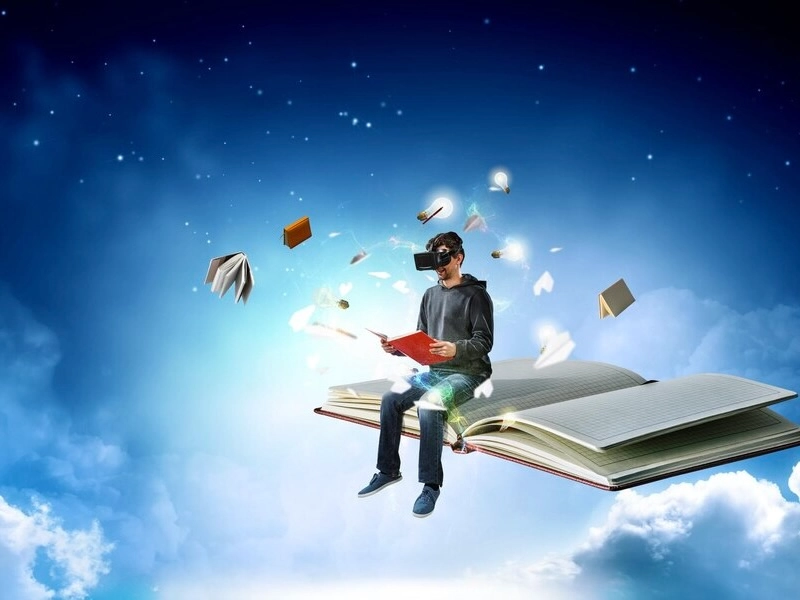- VR technology is being applied across various industries, including entertainment, healthcare, real estate, showcasing its versatility and potential impact on diverse fields.
- VR creates computer-generated environments that users can explore and interact with, offering immersive experiences that go beyond traditional forms of interaction.
- From tricking the brain into perceiving virtual environments as real to reshaping how we perceive and interact with the world, VR technology holds immense potential to change numerous aspects of human experiences and interactions.
Virtual reality (VR) technology has evolved from a niche concept to a mainstream phenomenon, with its applications spanning across various industries. By simulating immersive environments, VR has the power to transport users to different worlds, offering experiences that are not possible in the physical realm. From gaming enthusiasts to medical professionals, educators to architects, VR technology is being embraced for its potential to change countless fields.
1. Gaming and entertainment
In the realm of gaming and entertainment, VR technology has ushered in a new era of immersive experiences. With VR headsets and controllers, players can step into virtual worlds and interact with environments and characters in unprecedented ways. From adrenaline-pumping action games to serene exploration adventures, the possibilities are endless. VR has also extended beyond gaming, offering immersive experiences in film, music, and live events, allowing audiences to be fully immersed in their favorite stories and performances.
2. Education and training
VR technology is changing education and training by providing immersive and interactive learning experiences. Students can explore virtual environments, conduct experiments, and interact with simulations that bring learning to life. From medical students practicing surgical procedures to engineering students designing prototypes, VR enables hands-on learning in a safe and controlled environment. Additionally, VR-based training programs are being used across industries to simulate real-world scenarios and enhance employee skills, from customer service to hazardous environment training.
Also read: Virtual reality applications in education
3. Healthcare and therapy
In healthcare, VR technology is being used for both patient treatment and medical training. VR simulations allow medical professionals to practice complex procedures in a realistic setting, improving their skills and confidence. VR is also being utilised for therapeutic purposes, such as treating phobias, PTSD, and chronic pain. By immersing patients in virtual environments, VR therapy can help alleviate symptoms and improve mental well-being. Moreover, VR technology enables remote medical consultations and virtual surgeries, expanding access to healthcare services and expertise.
4. Architecture and design
Architects and designers are harnessing the power of VR technology to visualise and prototype buildings and spaces. VR allows stakeholders to explore architectural designs in immersive 3D environments, providing a more intuitive understanding of scale, proportion, and spatial relationships. Design iterations can be quickly implemented and evaluated in VR, accelerating the creative process and enhancing collaboration among team members. Additionally, VR walkthroughs enable clients to experience architectural designs before they are built, facilitating informed decision-making and reducing the risk of costly revisions.
Also read: Microsoft Teams introduces immersive 3D and VR meetings
5. Tourism and hospitality
VR technology is transforming the tourism and hospitality industry by offering virtual travel experiences and immersive hotel previews. With VR headsets, travelers can explore destinations around the world from the comfort of their homes, inspiring wanderlust and helping them plan their next adventure. Hotels and resorts are also utilising VR to showcase their accommodations and amenities, allowing potential guests to take virtual tours and make informed booking decisions. VR travel experiences provide a tantalising preview of destinations, enticing travelers to embark on real-life journeys.
6. Military and defence
In the military and defense sectors, VR technology is being used for training, simulation, and mission planning. VR simulations enable soldiers to practice tactical maneuvers, weapons handling, and combat scenarios in realistic environments, preparing them for real-world missions. VR also plays a crucial role in simulating complex military operations, allowing commanders to test strategies and evaluate outcomes without putting personnel at risk. Additionally, VR-based training programs enhance situational awareness and decision-making skills, ensuring military personnel are well-prepared for the challenges they may face in the field.
Also read: UK Network Rail employs VR to solve real-world concerns
7. Retail and e-commerce
In the retail and e-commerce industry, VR technology is enhancing the shopping experience and changing the way consumers browse and purchase products. Virtual stores and showrooms enable shoppers to explore products in immersive 3D environments, providing a more engaging and interactive shopping experience. VR try-on solutions allow customers to virtually try on clothing, accessories, and even makeup, helping them make confident purchasing decisions online. By bridging the gap between online and offline shopping, VR technology is reshaping the future of retail and redefining the concept of the digital storefront.

